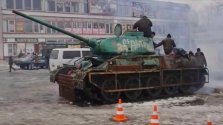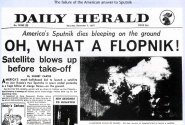You are using an out of date browser. It may not display this or other websites correctly.
You should upgrade or use an alternative browser.
You should upgrade or use an alternative browser.
Miscellaneous News
- Thread starter bd popeye
- Start date
AGM-183 ARRW test earlier this year also failed because the solid fuel rocket motor stage did not ignite. This problem doesn't seem to be one off but a persistent issue in the US MIC.LMAO it's not even the hypersonic vehicles that are failing, but the rockets carrying them. This is just ridiculous.
Good decision. Now do the same thing with the EU. Diplomacy should be between nations not between supranational organisations. It's a waste of taxpayers money in both nations.Russia’s dramatic decision to cut direct diplomatic ties with NATO further proof that Moscow no longer cares what the West thinks (2021/10/19)
By Paul Robinson, a professor at the University of Ottawa. He writes about Russian and Soviet history, military history and military ethics.
TWO DECADES AGO, President Vladimir Putin and his American counterpart, Bill Clinton, discussed Russia potentially joining NATO. Now, this week, Moscow has announced it is severing its last remaining diplomatic ties with the bloc.
The rapprochement with the West, it seems, is now truly dead and buried. Russia will withdraw its delegation from Brussels, and will send home NATO’s mission in Moscow from next month. The row ostensibly comes after the US-led bloc announced it would expel nearly half of Russia’s envoys, reportedly over unsubstantiated allegations of ‘espionage.’
BETTER TOGETHER?
One might imagine that groups would make better decisions than individuals. The input of a wide variety of views should produce wiser results than one person following his or her biases. Psychologists have, however, identified multiple problems with the dynamics of group decision-making that contribute to the opposite outcome. Groupthink, for instance, tends to produce conformity by suppressing dissenting points of view. And the phenomenon of “group polarization” pushes groups towards extreme positions.
With group polarization, sets of individuals adopt more extreme ideas collectively than each of them would have supported individually before discussions started. The process of discussion hardens attitudes around more radical positions, as the more moderate members of the group change their opinion in order to fit what they see to be the consensus. Thus, a study of US judges showed that, when making decisions alone, they made what were deemed “extreme” judgements 35% of the time, but when sitting in a panel of three, did so 65% of the time.
It seems that the Russian government has now lost patience with the primary Western multilateral organizations – the EU and NATO – preferring to bypass them to deal with their individual member states individually. Thus Russian Foreign Minister Sergey Lavrov declared earlier this year that, “there are currently no relations with the EU as an organization.”
TEARING UP TIES
Lavrov’s announcement on Monday that bilateral ties with NATO marks the end of nearly 30 YEARS of direct relations with the bloc, dating back to the creation in 1994 of the Partnership for Peace program and also to Russia’s participation in the 1996 mission in Bosnia, led by the bloc.
In an effort to come closer together, in 1997 the two sides signed the NATO-Russia Founding Act, which created a Permanent Joint Committee of representatives of both parties. In due course, this led to the establishment in 2002 of a NATO-Russia Council, whose purpose was to reassure Russia about the bloc’s intentions by allowing for consultations on key issues of joint interest.
While admirable in theory, in practice neither the Permanent Joint Committee nor the NATO-Russia Council were able to foster good mutual relations. Part of the problem was that both sides took actions that the other considered hostile: the bombing of Yugoslavia and Libya, and the expansion of the bloc on the one side; the takeover of Crimea and support for rebellion in Donbass on the other. Beyond that, though, the Russians found that dealing with NATO as a group didn’t work out quite the way they had imagined.
Moscow’s decision to withdraw its representatives from NATO is, therefore, hardly a shock, given that they were not, in practice, achieving anything. It is nevertheless symbolically extremely significant. Russia’s presence at the headquarters in Brussels, and similarly NATO’s presence in Moscow, at least indicated an aspiration on behalf of both parties to try to do something to repair their relations. Following Lavrov’s statement on Monday, it’s clear that nobody is interested any longer in even pretending that things might get better.
NOT PRETENDING ANY MORE
It’s hard to see where things go from here. Moscow will no doubt seek to bypass NATO and the EU, speaking directly to their members. In turn, the two organizations will see that as part and parcel of a deliberate strategy of divide and rule, with Russia being painted as trying to split the Western alliance. This will then be used as further evidence of Russian malice, even though in reality it’s more a product of frustration than anything else. The result may not be entirely to Russia’s liking.
While it won’t make the slightest bit of difference to either NATO’s or Russia’s policies towards each other, it does therefore tell us something very definite about the change in attitudes that has taken place in Russia OVER THE PAST 30 YEARS. Whereas once Russia’s rulers looked to integrate with the West, now they have slammed the door firmly shut, and made it clear that they intend to go their own way, come what may.
(…)
If you want to NATO or the EU to be treated like a country then merge into one country like Germany or the USA did. Otherwise GTFO.
solarz
Brigadier
Good decision. Now do the same thing with the EU. Diplomacy should be between nations not between supranational organisations. It's a waste of taxpayers money in both nations.
If you want to NATO or the EU to be treated like a country then merge into one country like Germany or the USA did. Otherwise GTFO.
I like how they put the bombing of Yugoslavia and the expansion of NATO on the same level as the annexation of Crimea, which has a majority of Russians wanting to join Russia, and the support of Donbass rebels, who are simply defending their homes and way of life from Ukrainian neo-nazis.
plawolf
Lieutenant General
Position of strength!
@solarz Sir since we are on the subject, My view the next war that may happen within the decade will be in Serbia, not in TW nor Ukraine. It is surrounded and NATO had escalatory dominance, Kosovo will be the pretext, A strike in Serbia is a blow to Russia, Ukraine is a mirage as Serbia is a tempting target and in geopolitics strategically located.I like how they put the bombing of Yugoslavia and the expansion of NATO on the same level as the annexation of Crimea, which has a majority of Russians wanting to join Russia, and the support of Donbass rebels, who are simply defending their homes and way of life from Ukrainian neo-nazis.
Let us not forget that the "annexation" of Crimea was a reaction to the US funding and organizing the Anti-Russian coup that toppled the democratically elected government of Ukraine in 2014.I like how they put the bombing of Yugoslavia and the expansion of NATO on the same level as the annexation of Crimea, which has a majority of Russians wanting to join Russia, and the support of Donbass rebels, who are simply defending their homes and way of life from Ukrainian neo-nazis.
Anglo media crowed a lot about the Chinese FOBS missing its target by two dozen kms, how far did the Anglo equivalent go towards reaching its target?
Answer: Anglo weapons Failed even to reach orbit
Russia should play up this angle more. Recently I saw a video of the rebels doing this:I like how they put the bombing of Yugoslavia and the expansion of NATO on the same level as the annexation of Crimea, which has a majority of Russians wanting to join Russia, and the support of Donbass rebels, who are simply defending their homes and way of life from Ukrainian neo-nazis.

They also managed to get an IS-3 running back when the fighting was at the peak. It left quite the impression in China and a saying has emerged about this:
"钢铁的领袖早已逝去,但领袖的钢铁将永远守护他的人民"
"The Leader of Steel is long gone, but the steel of the Leader will always protect his people"
Last edited:

